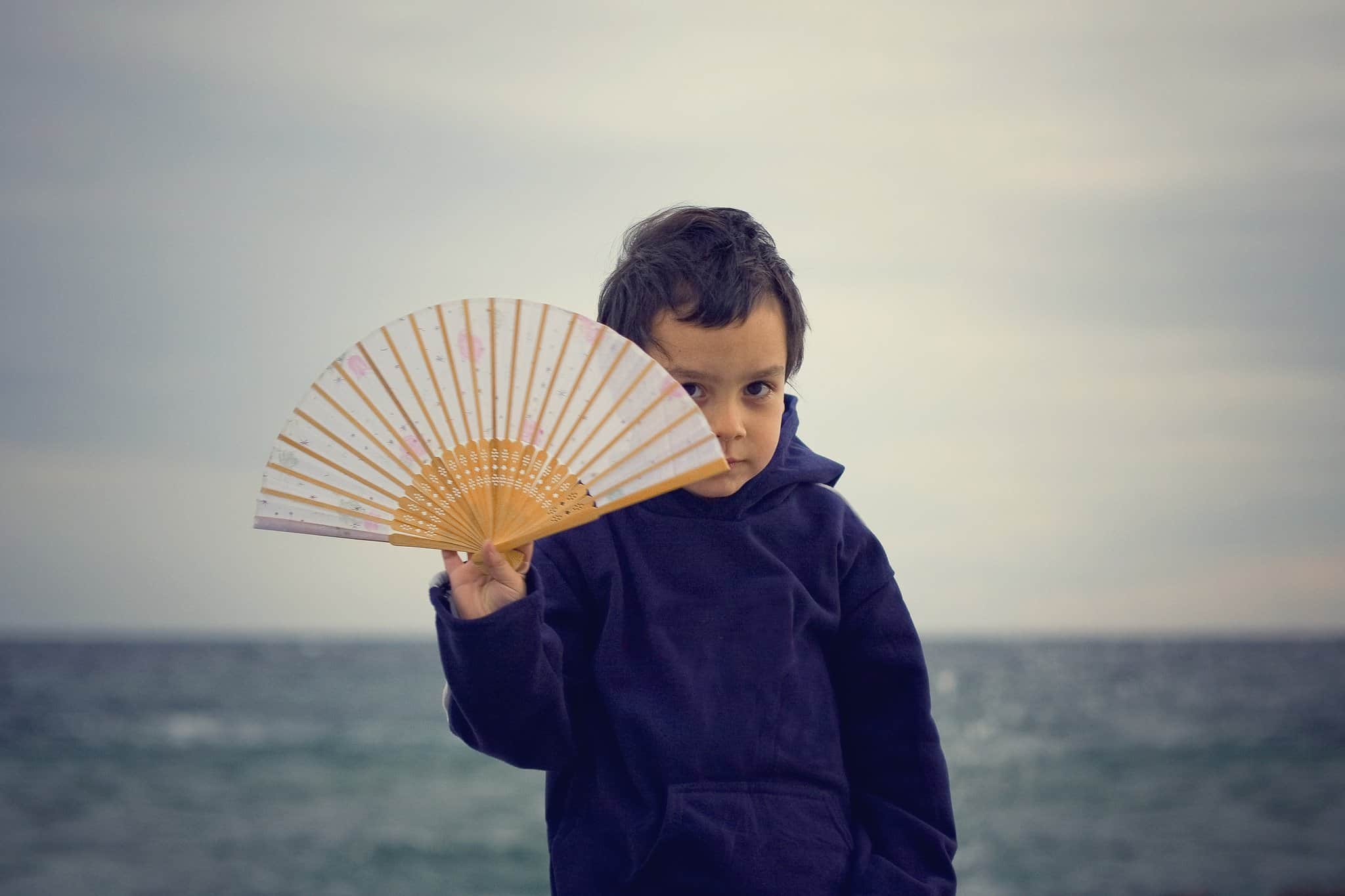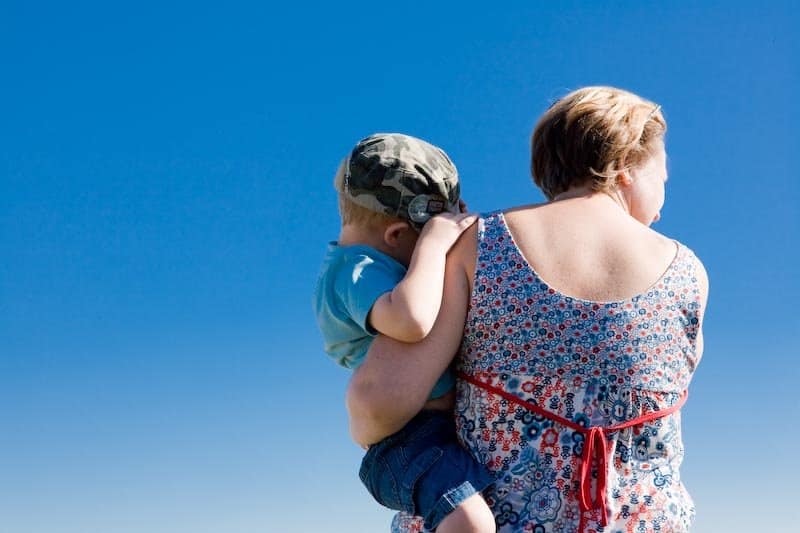Children of believing parents often ask their mothers and fathers questions about faith. However, parents do not always respond correctly to such questions. And here, we are not talking about the content of their answers only,  but also about their attitude to such questions in general.
but also about their attitude to such questions in general.
What mistakes are the most common and how to avoid them? Archpriest Andrei Bliznyuk, a teacher at St. Peter’s School in Moscow, replies.
Lack of Time for Answers, Underestimation of the Importance of the Questions

Giuseppe Milo
This applies not only to answers to questions about faith, because modern parents generally sorely lack time to communicate with their children. There are sociological studies according to which a modern parent communicates with his/her child for about ten minutes a day, and most of this time is spent not on heart-to-heart conversations, but on daily routine: “show me your school progress report,” “brush your teeth,” and “did you do your homework?” Therefore, children have to look for answers to their questions from strangers who may not have pedagogical skills, may not have genuine knowledge, and even may not always wish our children well. And do not entertain yourself with the illusion that it is enough to talk to your child once a week, give him/her a lecture and tell them what is good and what is bad. No, it is not enough! A child needs daily attention and daily answers to his or her questions.
Unfortunately, it is different in real life. Parents say: “I’ll tell you later,” “You are too small, you won’t understand,” “Ask your spiritual father about this next time you make a confession.” But imagine, a child comes to confession, and there are 70 other people waiting in line and the priest comes out of the altar to hear the confessions before performing the Sacrament of Holy Communion. Naturally, he will not answer this questions – he simply has no time.
That is why often children grow up, graduate from school and have no idea about the resurrection of the departed and the life of the age to come even having been raised in believing and church-going families. For example, a fifth-grader from a very pious family asked me a question, “Where are the bones of Jesus Christ?” Or some children do not know what the name Jesus really means. I can give a lot of such examples. And the reason is that parents do not talk to their children on spiritual topics.
Meanwhile, parents need to understand from the very beginning that children’s questions, including the ones that are not about the faith, are very important, and it is absolutely necessary to answer them. It is essential. Do you have no time? This means that you need to change something in your daily routine and find this time.
Moreover, you need to seriously prepare for answers to your children’s questions. It is best even to do this in advance: to talk with other parents, with your spiritual father, and to read Orthodox literature on this topic.
Sometimes your child may ask you a question that you do not know how to answer right away. In this case, one should say honestly, “I cannot answer now, but I will think about it, I’ll look for an answer and I will definitely tell you.” Obviously, you must keep your promise, and do it as quickly as possible. If you return to this conversation after six months, your child will already know in his consciousness that he asked a question and he did not receive an answer.
Naturally, parents should not direct all children’s questions about faith to a spiritual father or a teacher at an Orthodox school. By doing this, you thereby demonstrate to your child that the spiritual sphere is alien to you, that you do not know the Christian faith, that your membership in the Church is purely external and formal. Constantly dismissing your child by saying, “ask your spiritual father about this”, means having your child believe that you have nothing to answer.
But there are, of course, such questions when you can say to your child: ask your spiritual father about this too. The opinion of a confessor is very important, and it is essential for the family to know what their child asked the confessor about and what answer he or she received. Therefore, as a confessor, I try to share children’s questions with parents. In order for children to ask serious questions, I set aside special time in my lessons. I turn on the music and wait patiently. These questions allow me to build an interesting lesson. In order to better remember them, I have a box in the classroom where the children put notes with their questions. They, of course, ask me verbally too, but it is important for me that the questions remain fixed. I study the dynamics of questions in recent years, find some tendencies, and tell the parents of our students about it.
Outrage at the Inappropriate Form of a Question

Khuroshvili Ilya
This happens quite often as well: a child asks a question, wrapping it up in words that seem not pious enough to his parents or somehow too naive, if not idiotic. For example: “Will there be a giant strawberry in Paradise?”, “Can we baptize our cat?”, “Did Jesus Christ have a wife?” etc. “How dare you say that?!”, “How could you say such things?!” say parents indignantly to such questions. As a result, the child starts distrusting them, and feels afraid to ask them anything else, so as not to listen to his parents’ reproaches.
A relationship of trust with one’s child is the most important thing that parents should cherish, nurture and develop. A child should always know that no matter what he asks his parents about, he will not be put to shame, but will be supported.
Refusal to Answer Questions Asked Out of Idle Curiosity

Jaume Escofet
Sometimes parents feel that their child, when he is asking his question, is not very interested in the answer and is merely asking for no reason, and therefore they refuse to answer him. Maybe they refuse to do it politely, without reproaches, maybe they somehow laugh it off, but nonetheless they do not keep up the conversation.
Meanwhile, this is a serious pedagogical mistake. Even if the question is asked out of mere curiosity, it is still a signal for the parents that their child is experiencing a communication deficit. Clutching at his parents, seeing their eyes, he begins to ask them questions that first come to mind. But such “idle questions” can only be a prelude to a real conversation. With these questions, the child, perhaps, is testing you: are you even listening to him? And if we ignore his “idle” questions, he will not ask that real question that worries him, which for some reason he cannot immediately ask, maybe because he is shy or afraid. Therefore, parents should answer even an idle question, thinking about what will happen next? Where will the conversation turn?
Let me give you an example from one book. A child saw a cat at an entrance hall, he wanted to stroke it, but his father stopped him:
“Do not stroke it, it has fleas!”
“Where did she get fleas from?” the child asked.
“Another cat.”
“Where did the other cat get it from?”
The father explained patiently:
“The other cat got infected from another cat from another house, and it goes on endlessly!”
Then the child said:
“But, Dad, only numbers can be endless!”
And the father understood that his child was a philosopher! A cat is just a reason to talk, the child is interested in life, he already knows that there is an infinity of numbers, but there is no infinity of cats.
Child psychologists say that the most interesting and deepest questions are asked by children under the age of 13. Later grown-ups’ ignoring their questions and social stereotypes, extinguish children’s philosophical interests. A child becomes “like everyone else”, does not strive to stand out, is afraid of ridicule, and protects the boundaries of his or her personal space. This is why it is absolutely essential to answer even the strangest questions of one’s children. These questions, with all their external naivety, can turn out to be incredibly deep.
I will give you examples from my family life. When one of my daughters was five years old, she realized that all people are mortal, that this is inevitable, and she cried. I began to console her, told her about the Kingdom of Heaven, about God and eternal life. She calmed down a little, and then, already falling asleep, she said: “Dad, I will miss you when you die!” I began to console her again, and she suddenly asked: “Dad, will you recognize me in paradise?”
This childish question is actually incredibly deep and spiritual. Indeed, here on earth, a person often sees only the external, but cannot see what is stored inside someone else, that is, their souls. Even if this is his close one. Therefore in heaven, this person will simply not recognize these souls, he will pass them by, they will remain an unsolved mystery for him. Only those who during their lifetime, have known each others’ hearts and have become very close, will recognize each other. A five-year-old child, of course, cannot yet express it in an adult way, but they are quite capable of feeling it.
Here is another example with my other daughter. She was not yet four years old then, probably. Before going to sleep, she asked me: “Dad, do I have a little one in my belly?” I was taken aback, I answered: “Why would you, honey, go to sleep!” But she was not satisfied with my answer and asked me: “Not even one as small as a grain?” I was somehow at a loss: it seemed too early to tell her about the reproductive system! I muttered something like “Well, let’s talk later…” She sighed saying: “It’s a pity… I would have called him Tema.”
Then I realized that I was simply not ready for such conversation, not ready for the fact that a child even at this early age can think so deeply and feel that motherhood is already awakening in her, and I could no longer just tell her “When you grow up, I’ll tell you”. It is essential to prepare answers in advance.
Answer for One Occasion

Alston Huang
When a child asked you and you replied, this does not mean that the issue is resolved. The child received a response from you, but this is only the beginning of the conversation. It is important that he receives an answer to the same question from other people. If a child asked his mother a question, she should tell the child’s father about it, telling him that the child asked this and her reply was the following. It would be wonderful if the father comes up to the child and says: “You know, mom told me what question you asked her. It is very good that you think so deeply! For my part, I could answer you like this…”
That is, it is important that the child has a wider perception of the world, and not a flat, monotonous one. After all, men and women think a little differently, and they will talk with a child in different ways, and the result will be a stereo effect.
In addition, even if no one besides you will answer to this question, it would be good after some time, when the child becomes older, to return to this conversation, to show him some other aspects of the issue that might have been inaccessible to him earlier. This, of course, primarily concerns worldview or theological questions like “why is there so much evil in the world?”, “Why does the Bible say nothing about dinosaurs?”, “Why does God not prevent evil people from offending good people?” etc. Such issues can never be fully settled, the older the child becomes, the deeper the answer he can perceive.
And, certainly, if the parents answered right away and they feel that they are not really familiar with this topic, that their answer was too approximate, they need to study it deeper, read some literature, ask people who know much about it, and as soon as possible talk about it with their child again, and update their answer.
Reassessment of Your Knowledge

Swansea Photographer
However, sometimes parents are absolutely convinced that they already know everything about Orthodoxy and can answer any question unmistakably. They answer children right away, but answer incorrectly. Their answers do not correspond to the church tradition. Their answer is based on some stereotypes prevailing in the church environment, on some rumors, or they thoughtlessly repeat someone else’s words.
Often this is especially the case with issues of church life, which are now especially relevant, which agitate public consciousness. For example, what is heresy? Is ecumenism a heresy? Parents who are fighting with this heresy on the Internet respond appropriately to their children, not trusting the opinion of the priests.
Meanwhile, it is very important that a child understands: he has a family, but there is also the church, there is a confessor, there is also a parish community, and there is no need to isolate himself (including his questions) only within the boundaries of his family. Naturally, I’m talking about a situation when there is an attentive spiritual father and a healthy parish community (and there are more and more of them).
If a child only talks with his parents, when he grows up, when he turns 14 or 15 years old, when the parental authority falls, he will remain with his questions one on one. He will no longer ask his parents, because he will not trust them, and there will be no one else around.
Translated by pravmir.com














